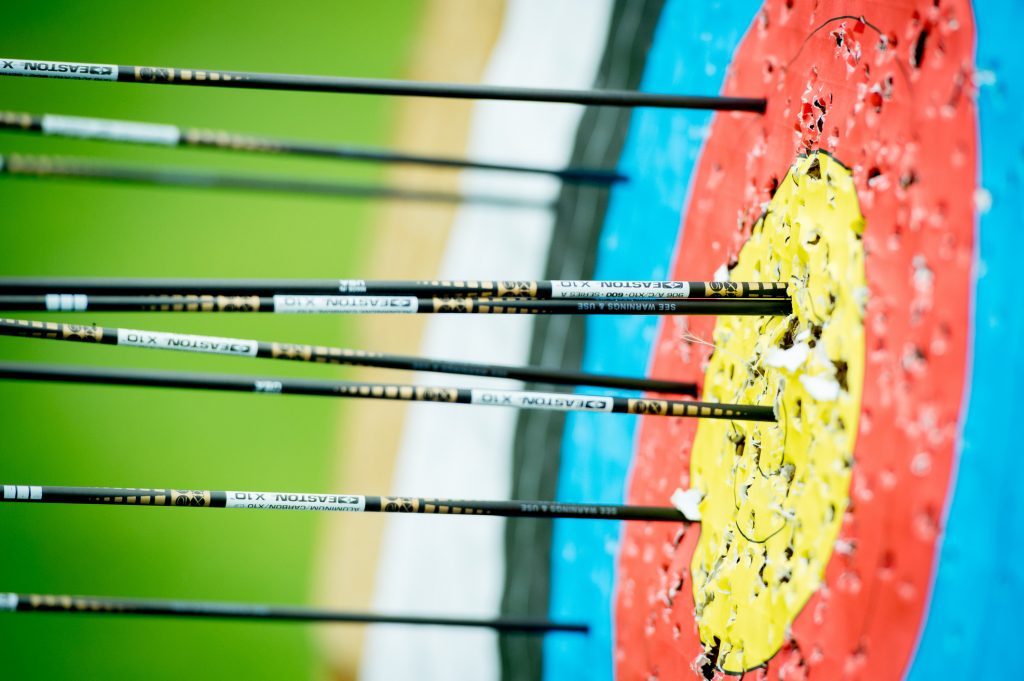I got into archery about two years ago. I shoot a recurve bow instinctively, which means no sights or points of reference for aiming, and no gear or equipment to help me pull back the weight of the bow. Just the stick, the string, the arrow, and my brain.
It’s difficult, but incredibly rewarding. When I first began taking lessons, my instructor told me that many aspects of archery can be applied to other areas of our lives. As I practiced, I began to realize that I could apply the lessons I was learning in my classes to my walk with God. Specifically, it occurred to me that shooting an arrow is a lot like taking a leap of faith when God calls you to do something big or different — something that has always terrified me, if we’re being honest.
Here are a few archery principles and their faith parallels that I’ve had the chance to apply in my own life:
Focus on the target
This is the very first thing I was taught. Because the only thing I use to aim is my brain, I have to look at the exact point where I want my arrow to go and tune out the other sights and sounds around me. When we are trying to discern God’s will for us, we must tune out the distractions that could be keeping us from hearing His voice, whatever those distractions might be. All our attention must be focused on the target — namely, obedience to God and what will glorify Him. (Hebrews 12:1-2)
Practice, practice, practice
In archery, constant practice keeps your muscle memory, and therefore your form, sharp. Identifying my target, drawing the bow, and releasing the arrow all involve many small steps that are vital to proper form. I can tell I’ve gone too long without practicing if I don’t draw my bow smoothly and easily the first time I pick it up, or if I find myself second-guessing my subconscious to make all the calculations necessary. Constant practice increases strength and endurance, and allows me to shoot my bow more easily and increase my bow weight when I am ready.
In a similar way, regular time in God’s Word, in prayer and in worship builds our faith muscle and allows us to make leaps of faith with less of a struggle. It becomes easier to trust God the more we do it, and we’re able to trust Him with bigger things. (Psalm 119:105, Ephesians 6:10-18)
Letting down
One lesson my instructor had to drill into my head was to let down, or un-draw the bow, if anything felt “off.” My shoulder alignment, my grip on the string —anything. It’s better to try again from the beginning than to make a bad shot.
This is comparable to setting yourself up for a big decision or action and realizing that something is wrong. Maybe you don’t feel a spiritual peace, maybe your decision doesn’t line up with Scripture, or maybe you have sought godly counsel and the advice doesn’t support what you’re about to do. It can be hard, but it’s better to back off than to make a shot that could land you way off target. You can pray, search the Word, and speak to some mature Christians before making a final decision — anything that’s needed to prompt a “reset” that could save you an unnecessary detour, heartache or worse. (Hebrews 4:12, James 5:16)
Taking care of my equipment
It’s important that I regularly check my bow and arrows for damage, and take care of them. This includes checking the bow limbs for any twisting, waxing the bow string, cleaning moisture from the metal fixtures, or checking my arrows for cracks.
It’s also important that we regularly examine our spiritual lives for weaknesses, flaws or sin patterns so our shots aren’t off target. This can be started through introspection, but it’s best to keep your spiritual walk in good condition by involving yourself in a Christian community, internalizing the lessons from your church pastor, and seeking counseling and mentorship. (Colossians 3:12-17) It is also important to take care of our bodies through balancing work and rest, getting proper nutrition, and anything else we need to do to ensure our physical and mental health. Our bodies are God’s temple, and need to be in good health in order to serve Him. (1 Corinthians 6:19-20)
Calm, confidence, and commitment
One of the most difficult things for me to learn was to approach my shot with calm, confidence and commitment. If I’m calm (breathing slowly, moving smoothly) and confident (a positive mental state), then I give my subconscious the best chance to make an accurate calculation. Once I’ve decided to make the shot, I have to commit by releasing the string without any hesitation and performing a proper follow-through once my fingers leave the string. A lack of calm, confidence or commitment will most often result in a poor shot.
In our spiritual walk, it’s important that we follow our faith over our feelings, putting aside fear and doubt. Once we’ve consulted God’s Word and godly mentors, prayed and listened to the Holy Spirit, gathered the necessary facts and examined the circumstances, we have what we need to move ahead. If we trust that God is sovereign and good, we can make the leap with confidence and commitment. (Philippians 3:13-14)
Conclusion
A relationship with God is unlike anything else on this earth, and there is no perfect metaphor that can totally capture what it is like to develop and grow in your knowledge of Him. However, by looking at the natural world or even hobbies in our daily lives, we can realize small truths about different aspects of our faith, using them as reminders for the journey.
What sort of things in your daily life could be spiritual lessons for you? Is it something in nature? A favorite pastime? What is God trying to teach you through them?











